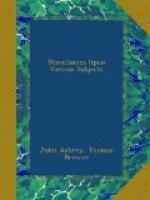By J. Aubrey, Esq.
**Printed in “Miscellanies
on several curious subjects.”
London, E. Curll,
1714.
At a meeting of gentlemen at the Devizes, for choosing of Knights of the Shire in March 1659, it was wished by some, that this County (wherein are many observable antiquities) was surveyed, in imitation of Mr. Dugdale’s illustration of Warwickshire; but it being too great a task for one man, Mr. William Yorke (Councellor at Law, and a lover of this kind of learning) advised to have the labour divided: he himself would undertake the Middle Division; I would undertake the North; T. Gore, Esq., Jeffrey Daniel, Esq., and Sir John Erneley would be assistants. Judge Nicholas was the greatest antiquary, as to evidences, that this County hath had in memory of man, and had taken notes in his Adversariis of all the ancient deeds that came to his hands. Mr. York had taken some memorandums in this kind too, both now dead; ’tis pity those papers, falling into the hands of merciless women, should be put under pies. I have since that occasionally made this following Collection, which perhaps may some-time or other fall into some antiquary’s hands, to make a handsome Work of it. I hope my worthy friend Mr. Anthony Wood of Oxford will be the man. I am heartily sorry I did not set down the antiquities of these parts sooner, for since the time aforesaid, many things are irrecoverably lost.
In former days the churches and great houses hereabouts did so abound with monuments and things remarkable, that it would have deterred an antiquary from undertaking it. But as Pythagoras did guess at the vastness of Hercules’ stature by the length of his foot, so among these ruins are remains enough left for a man to give a guess what noble buildings, &c. were made by the piety, charity, and magnanimity of our forefathers.
And as in prospects, we are there pleased most where something keeps the eye from being lost, and leaves us room to guess; so here the eye and mind is no less affected with these stately ruins, than they would have been when standing and entire. They breed in generous minds a kind of pity, and sets the thoughts a-work to make out their magnifice as they were taken in perfection. These remains are “tanquam Tabulata Naufragii”, that after the revolution of so many years and governments, have escaped the teeth of Time, and (which is more dangerous) the hands of mistaken Zeal. So that the retrieving of these forgotten things from oblivion, in some sort resembles that of a conjurer, who make those walk and appear that have lain in their graves many hundreds of years, and to represent, as it were to the eye, the places, customs, and fashions that were of old time.
Let us imagine then what kind of country this was in the time of the ancient Britains, by the nature of the soil, which is a soure, woodsere land, very natural for the production of oaks especially; one may conclude, that this North-Division was a shady, dismal wood; and the inhabitants almost as salvage as the beasts, whose skins were their only raiment. The language, British (which for the honour of it, was in those days spoken from the Orcades to Italy and Spain). The boats on the Avon (which signifies river) were baskets of twigs covered with an ox-skin, which the poor people in Wales use to this day, and call them curricles.




